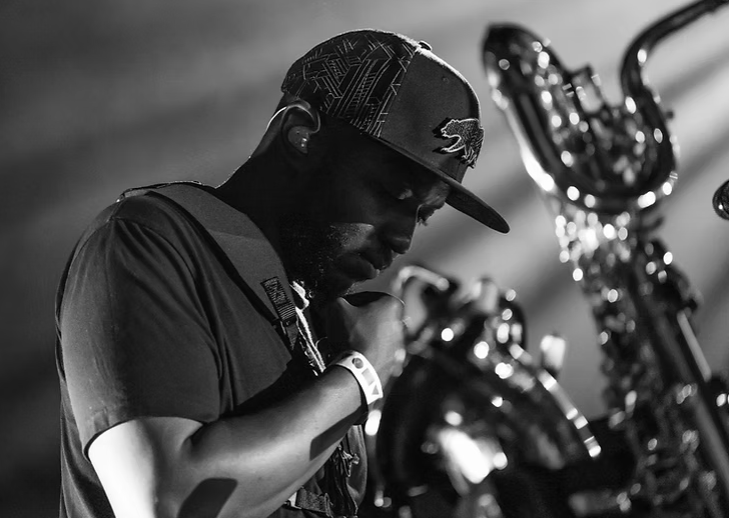
Colorectal cancer is a disease that affects thousands each year, yet early detection and awareness can make all the difference. For Ayla, this mission is deeply personal. After losing her husband, James Casey—a renowned saxophonist who performed with the Trey Anastasio Band, Phil Lesh & Friends, The Roots, and more—to colon cancer at 38, she has committed herself to honoring his legacy by raising awareness and advocating for early detection.
Dr. Pascale White, a gastroenterologist with the Association of Black Gastroenterologists and Hepatologists (ABGH), joins the conversation to highlight the critical importance of screenings and self-advocacy in preventing and detecting the disease. Together, their insights shine a light on the rising cases of colorectal cancer among younger adults and the steps that can be taken to save lives.
Turning Pain into Purpose
James was diagnosed with colorectal cancer during the COVID-19 pandemic, at a time when cancer was the furthest thing from his mind. As a musician, he had just returned from a historic performance at Red Rocks in Colorado, only to find himself feeling unwell. What started as discomfort quickly escalated, leading to a shocking diagnosis.
Despite being a private person, James made the courageous decision to share his journey publicly. His motivation was clear—colorectal cancer is preventable if caught early, and he wanted to ensure that no one else had to endure what he was going through. His advocacy was driven by the desire to empower people with knowledge, encourage them to take action, and prevent others from experiencing the pain he and his loved ones faced.
RELATED: “At 35, I Got Colon Cancer”: Here’s My Warning to Young, Healthy People
The Rising Trend in Colorectal Cancer Cases Among Young Adults
Dr. Pascale highlights a concerning trend: an increasing number of individuals under 50 are being diagnosed with colorectal cancer. This alarming rise in cases led medical professionals to lower the recommended screening age from 50 to 45.
“The trend was certainly alarming—to note that patients under 50 were getting diagnosed at higher rates,” Dr. Pascale explains. “Lowering the screening age to 45 is a way to catch these cancers earlier before they become more advanced.”
One of the biggest challenges is that younger patients are often diagnosed at later stages. Many dismiss symptoms, assuming they are caused by stress or other benign issues.
“Being aware of the signs and symptoms and not just saying, ‘I’m too young for that,’ is crucial,” she adds. “That mindset can be a fatal mistake, because catching these cancers early increases survival rates.”
According to the Colorectal Cancer Alliance, colon cancer symptoms include:
- A change in bowel habits
- Persistent abdominal discomfort
- Rectal bleeding
- Weakness and/or fatigue
- Unexplained weight loss

Common Misconceptions About Colorectal Cancer
Many people believe that if they don’t have symptoms, they don’t have cancer. This misconception is particularly common among younger individuals, especially within the Black community.
“A lot of young Black men I’ve spoken to at different events believe that if they’re not having symptoms, then they don’t have colorectal cancer,” Dr. Pascale says. “But colorectal cancer starts long before symptoms appear. Screenings can detect polyps—small growths in the colon—that can be removed before they become cancerous.”
This is why routine colonoscopies are crucial. Detecting and removing precancerous polyps can prevent cancer from developing altogether.
RELATED: Doctors Said It Was Just Pregnancy, But It Was Cancer: ‘Trust Your Own Body’
Understanding Polyps and Colonoscopy Screenings
For those who undergo a colonoscopy and have polyps removed, follow-up screenings are essential.
“When we remove polyps, we send them to the lab to determine whether they are benign or precancerous,” Dr. Pascale explains. “If someone has a history of polyps, they are placed on a surveillance program, meaning they may need colonoscopies more frequently—anywhere between 1, 3, 5, 7, or 10 years—depending on their risk factors.”
Family history also plays a role in determining how often screenings should occur, further emphasizing the importance of knowing your medical background.
RELATED: “No More ‘Do It Later’”: Deondre Williams on Life After Colon Cancer
Continuing James’ Legacy
Following James’ passing, Ayla has committed herself to ensuring his message reaches as many people as possible. She has built an initiative that includes webinars, screening drives, and fundraising efforts through the music community that supported James throughout his career.
“By engaging artists and their fan bases, we can spread this message far and wide,” Ayla explains. “This conversation might not impact someone immediately, but down the road, it might be the push they need to get screened or talk to a doctor.”
James’ music, which was a fundamental part of his identity, also played a significant role in his cancer journey. Performing gave him strength, and his own songwriting evolved as he reflected on his legacy. One of his songs, “New Bloom”, serves as an anthem of perseverance, reminding listeners to make the most of every day.
Being Your Own Advocate
By sharing his personal battle with colon cancer, James has conveyed a powerful and inspiring message—know your family history, have open discussions, and take charge of your health. He experienced firsthand how some doctors initially dismissed his symptoms, but he refused to be ignored. His story also serves as an important reminder:
If someone isn’t listening to you, find someone who will.
Dr. Pascale echoes this sentiment, especially for younger individuals who may believe they are too young to be at risk. “The rise in colorectal cancer among younger adults is real. If something feels off, trust yourself and push for answers.”

Key Takeaways and How to Get Involved
When asked what key takeaway she hopes people will remember, Ayla reflects on her journey alongside James.
“I think about all the things we didn’t know and the things we discovered through this journey,” she says. “We kept having these moments—‘If only we knew this sooner.’ We didn’t know anything about colorectal cancer. We didn’t know how rare it was in young people. We didn’t understand why we had inconsistent experiences with different doctors. Awareness and knowledge are empowering. If you or a loved one ever find yourself in this situation, know that there are resources available—you don’t have to go through it alone.”
For those who want to support the cause, Ayla encourages participation in their upcoming webinar.
“Come join us,” she says. “This conversation doesn’t have to be scary. It’s about demystifying fear, empowering yourself, and making health a priority in a way that feels good.”
Dr. Pascale agrees and emphasizes that taking action now can make all the difference.
“James was incredibly brave. He wanted people to understand that colorectal cancer is preventable,” she says. “I hope that the webinar encourages people to take control of their health—because catching this early, or preventing it altogether, is possible.”
As Ayla puts it:
“This is self-love. Taking care of yourself, advocating for your health, and prioritizing screenings—this is what self-love looks like.”
To learn more about colorectal cancer awareness, visit the Colorectal Cancer Alliance, Fight CRC, and other advocacy organizations.
To learn more about James Casey, his cancer battle and how it intersected with his musical journey, watch the docu-short Music As Medicine: A James Casey Story and visit his official website for music, merch and more.









